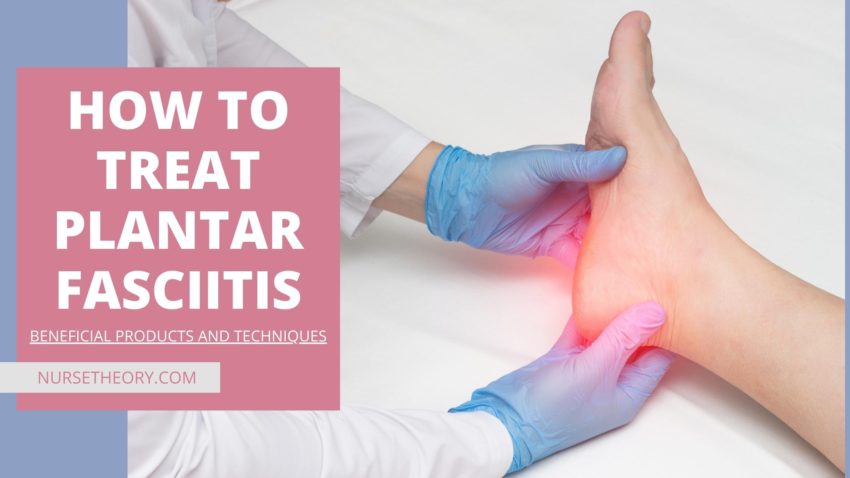
Understanding how to treat plantar fasciitis is vital to ensure you maintain optimal foot health.
Nevertheless, you must consult a foot specialist if you have plantar fasciitis or severe foot conditions.
Plantar fasciitis is when the connective tissue on the bottom of the foot becomes abnormally stretched, pressured, and pulled beyond its normal range.
As a result, it causes stress, pain, tightening, and eventually, more severe foot conditions if not treated properly.
Due to the importance of proper foot care, various products help prevent plantar fasciitis and improve recovery.
First, if you’re dealing with plantar fasciitis, seek the advice of a professional foot specialist.
Most importantly, don’t try to diagnose and treat yourself.
It’s essential to ensure that you take the proper steps to heal yourself and maintain good foot care.
The products mentioned below help you maintain optimal foot health.
They can be helpful whether you’re trying to prevent, minimize, or heal from plantar fasciitis.
However, these products are not a replacement for professional help.
Here are some products, accessories, and essentials to keep your foot healthy and in optimal condition.
Information to Consider:
- Choose shoes designed for your activity
- Use premium insoles/orthotics
- Wear compression socks
Choose Shoes Designed for Specific Activities
One of the most important decisions you can make is to choose shoes designed for your specific activities or work.
Choosing properly designed shoes is the first line of defense for maintaining foot health.
Choosing shoes with proper support and cushioning minimizes the chances of developing plantar fasciitis and other conditions.
Conversely, the wrong shoes can place stress on your feet and back, leading to pain and worsening existing conditions.
Read the list below to give you an idea of the commonly worn shoe varieties.
Common Types of Specialized Shoes:
- Walking/running shoes
- Plantar fasciitis shoes
- Tennis sneakers
- Cross-fit shoes
- Weight lifting shoes
- Nursing shoes
- EMS boots
- Construction boots
- Hiking shoes/boots
As you can see, specialized shoes can be essential for foot and lower body health.
They allow individuals to participate in a designated activity while being adequately supported.
They are less likely to get injured or develop a condition such as plantar fasciitis.
Choose properly supported shoes if you don’t have severe medical conditions and want to minimize developing foot/back ailments.
First, before purchasing footwear, consider your foot’s shape.
Factors Related to Foot Shape Include
- Having a low, medium, or high arch
- Supination or overpronation
- Foot size/length
- Foot width
- And other factors
Altogether, these factors can affect a shoe’s fit and what type of footwear is best for your needs.
It’s essential for those who lead active lives or spend lots of time on their feet.
For example, runners, hikers, and nurses are all known for constantly being on their feet.
However, they have very different needs and require shoes specifically designed for their activity.
If you have difficulty finding proper footwear, have your feet measured to determine your foot’s shape and size.
Additionally, examine how your feet displace your body weight, so you obtain footwear that accommodates your needs.
Use Premium Orthotics to Improve Support and Comfort
Premium orthotics/insoles rest on top of a shoe’s midsole to provide the foot’s bottom with comfort, support, and shock absorption.
These insoles can be especially effective for those with high or low arches.
It works by contouring the foot’s shape in weak areas or sensitive to unbalanced weight distribution.
Moreover, insoles help footwear with poor arch support or a design that doesn’t accommodate the user’s activity.
For those who spend months/years walking or running around, insoles can be great for minimizing foot and back pain, primarily if you work in a field such as healthcare or services.
Aside from providing stress relief, insoles may assist with certain medical foot conditions.
In these cases, a specially designed insoles insert may be recommended by a podiatrist to correct or prevent certain conditions.
Common Foot Conditions Include
- Abnormal foot arches
- Bunions
- Heel pain
- Overpronation
- Plantar fasciitis
- Stability issues/weight distribution imbalances
- And other ailments
When it comes to plantar fasciitis, a well-designed insole can reduce foot stress and improve weight distribution across the foot.
As a result, it can reduce damage and aid in the prevention/recovery of specific medical conditions.
In summary, insoles are extremely valuable for those who spend lots of time standing, walking, and running around.
They’re also ideal for those with specific ailments requiring additional support and aid.
Premium insoles are ideal for:
- Service workers
- Emergency medical specialists
- Healthcare professionals/nurses
- Construction workers
- Athletes
- Commuters
- Jobs that require standing for long sessions
Wear Compression Socks to Promote Circulation
Compression socks and foot wraps improve blood circulation and oxygenation throughout the legs and feet.
They assist with muscle fatigue recovery after exercise or long periods of standing.
In addition to improving blood circulation, compression socks may help minimize venous disorders.
It includes varicose veins, venous ulcers, swelling, and pain caused by sore muscles.
Individuals in nursing, EMS, hospice care, and service workers can benefit from wearing compression socks daily.
Additionally, those in physical recovery, sports, commuters, travelers, and pregnant women use compression socks to improve physical health and healing.
Who Wears Compression Socks?
- Athletes
- Commuters
- Pregnant women
- Healthcare workers
- Construction workers
- Laborers
- Individuals with various venous disorders
- Individuals who recently had surgery or physical therapy
- Pregnant mothers (consult a doctor before wearing compression socks)
As you can see, compression socks can help with various conditions by improving blood circulation throughout the feet and legs.
Moreover, wearing compression socks with adequate footwear and insoles can minimize plantar fasciitis and other conditions.
You may consider compression socks for plantar fasciitis with heel cushioning for comfort and support.